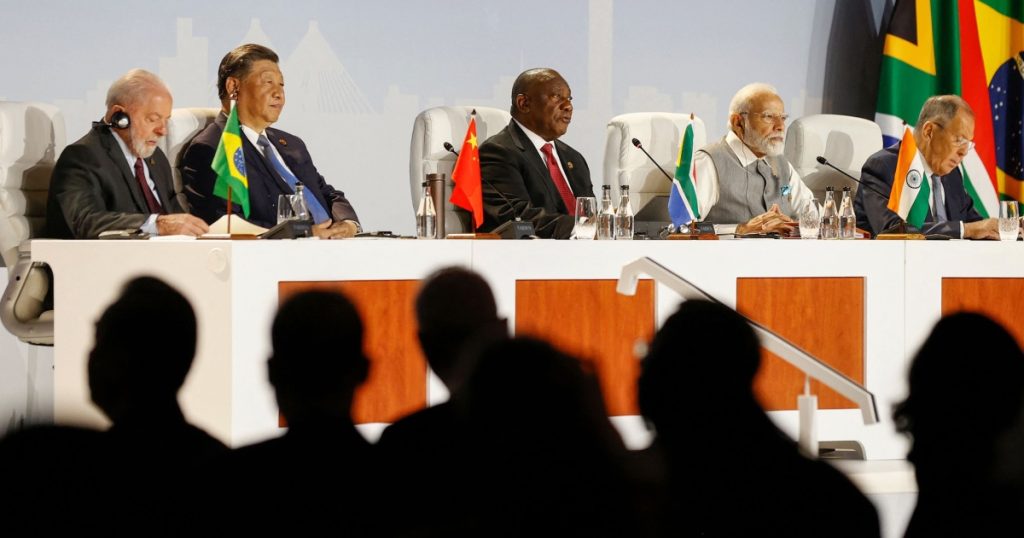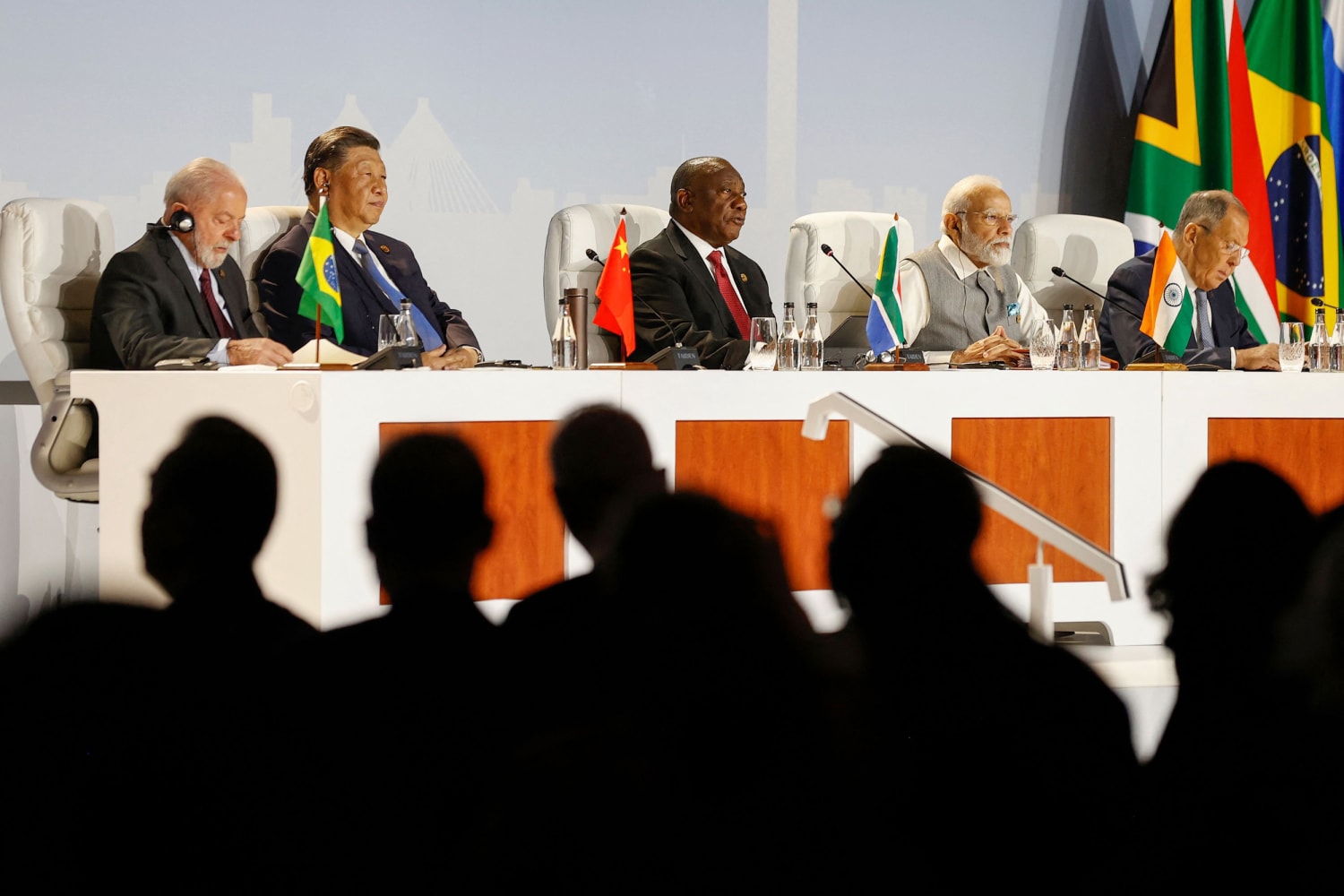

The BRICS economic coalition of emerging markets on Thursday extended membership invitations to six nations, South African President and current BRICS chair Cyril Ramaphosa said.
The BRICS alliance — which is composed of Brazil, Russia, India, China and South Africa — is set to invite Argentina, Egypt, Ethiopia, Iran, Saudi Arabia and the United Arab Emirates to join, Ramaphosa said in a speech published on the X social media platform, previously known as Twitter.
Their membership would take effect from Jan. 1, 2024.
South Africa is presently hosting the 15th BRICS summit, where the group’s expansion was a key point of the meeting agenda. Russian President Vladimir Putin was unable to attend in person, likely on account of an International Criminal Court warrant that would have theoretically obliged the host country — an ICC signatory — to proceed with his arrest.
“BRICS is a diverse group of nations,” Ramaphosa said. “It is an equal partnership of countries that have differing views but a shared vision for a better world. As the five #BRICS members, we have reached agreement on the guiding principles, standards, criteria and procedures of the #BRICS expansion process.”
More than 20 countries have formally applied for BRICS membership, including the six that Ramaphosa said were hereby invited. Other major African players, such as Nigeria and Ghana, have expressed informal interest.
China’s President Xi Jinping said Thursday that the expansion is a “new starting point for BRICs cooperation.”
He added, “It will bring new vigor to the BRICS cooperation mechanism, further strengthening a force for world peace and development,” he said at a press briefing, in comments officially translated by a summit interpreter.
Putin thanked Ramaphosa’s “unique diplomatic mastery as we negotiated all the positions, including when it comes to BRICS expansion,” noting the talks proved to be “challenging work,” according to an official summit translation.
Ramaphosa hinted at the possibility of future additions.
“We value the interest of other countries to form a partnership with BRICS. We have tasked our foreign ministers to further develop the BRICS country model and a list of prospective partner countries and report by the next summit,” he said during a press briefing of BRICS officials on Thursday.
“The relevance of the BRICS is demonstrated by the growing interest of other countries to join our group,” said Brazilian leader Luiz Inácio Lula da Silva. “Now the BRICS is going up to 37% of the world’s GDP in terms of its purchasing power, and 46% in terms of the world population. BRICS will continue [being] open to new members.”
India’s Prime Minister Narendra Modi said the “expansion and modernization of BRICS is a message that all institutions in the world need to mold themselves according to changing times.”
The UAE welcomed the membership announcement.
“We respect the vision of the BRICS leadership and appreciate the inclusion of the UAE as a member to this important group. We look forward to a continued commitment of cooperation for the prosperity, dignity and benefit of all nations and people around the world,” UAE President Mohammed bin Zayed said on X in the wake of the announcement.
Mohammad Jamshidi, deputy chief of staff for political affairs to the Iranian president, called Tehran’s BRICS membership “a strategic victory for Iran’s foreign policy” in a post on X.
Currency clout
Gustavo de Carvalho, policy analyst and senior researcher at the South African Institute of International Affairs, said on X that the prospective new members will not only increase the visibility of the BRICS bloc, but also provide an opportunity for coalition participants to trade with one another in local currencies.
Brazil’s da Silva on Thursday noted the BRICS group continues to study the possibility of a bloc currency, which could “increase our options for [a] means of payment and reduce our vulnerabilities,” according to an official summit translation.
“It’s still uncertain what will happen to the group dynamics, but clearly it brings a new space for trade within the Global South. Much of the arguments in the communique reflected the collective voice on need for change of international institutions, especially international financial institutions like the World Bank, IMF [International Monetary Fund] and WTO [World Trade Organization],” de Carvalho noted.
BRICS nations have struck different tones on their relationship with the West. Commercial and diplomatic tensions have risen between China and the U.S., while Russia is under a spate of Western sanctions for its invasion of Ukraine.
“We are concerned about ongoing conflicts in many parts of the world. We stress our commitment to the peaceful resolution of differences and disputes through dialogue and inclusive consultation,” Ramaphosa said during the Thursday press briefing, without naming the conflicts in question.
The new BRICS members bring their own challenges. Iran contends with U.S. sanctions over its nuclear program, while fresh clashes in Ethiopia have raised concerns over internal stability. Egypt has faced economic pressures, and Argentina recently sharply devalued its national currency — the peso — and jacked up interest rates following the shock primary election win by far-right libertarian Javier Milei. The UAE and Saudi Arabia are both actively pursuing growth in non-oil sectors, even as Riyadh faces ongoing Western criticism of its human rights record.
 Latest Breaking News Online News Portal
Latest Breaking News Online News Portal





